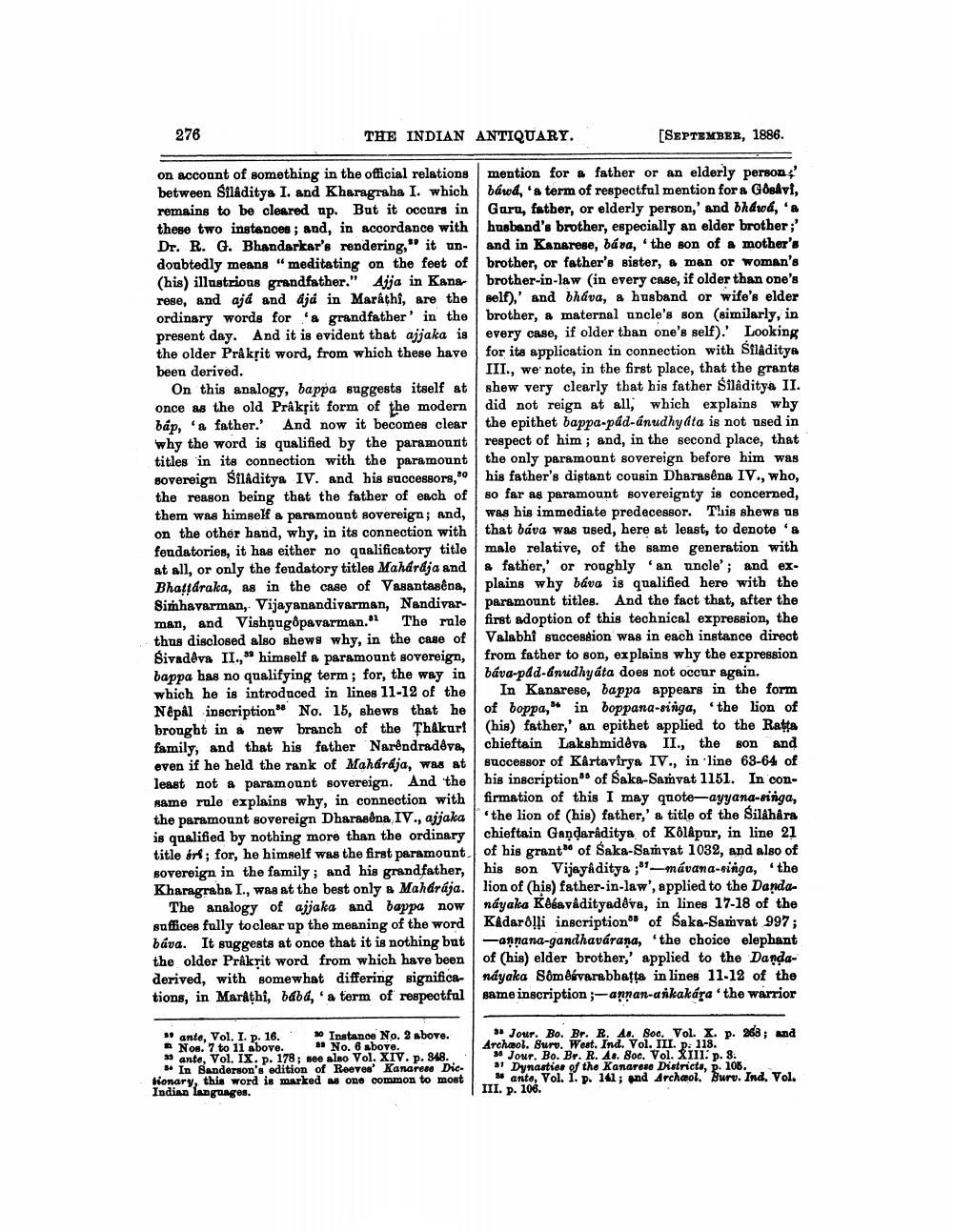________________
276
THE INDIAN ANTIQUARY.
[SEPTEMBER, 1886.
on account of something in the official relations mention for a father or an elderly person' between Siladitya I. and Kharagraha I. which bárod, a term of respectful mention for a Goskvi, remains to be cleared up. But it occurs in Garn, father, or elderly person,' and bhdvá, 'a these two instances; and, in accordance with husband's brother, especially an elder brother;' Dr. R. G. Bhandarkar's rendering," it un- and in Kanarese, báva, the son of a mother's doubtedly means "meditating on the feet of brother, or father's sister, a man or woman's (his) illustrious grandfather." Ajja in Kang brother-in-law (in every case, if older than one's rese, and ajá and djá in Marathi, are the self),' and bháva, a husband or wife's elder ordinary words for 'a grandfather' in the brother, a maternal uncle's son (similarly, in present day. And it is evident that ajjaka is every case, if older than one's self). Looking the older Prakrit word, from which these have for its application in connection with SilAditya been derived.
III., we note, in the first place, that the grante On this analogy, bappa suggests itself at shew very clearly that his father Siladitya II. once as the old Pråkpit form of the modern did not reign at all, which explains why báp, 'a father.' And now it becomes clear the epithet bappa-pád-ánudhyata is not used in why the word is qualified by the paramount respect of him; and, in the second place, that titles in its connection with the paramount the only paramount sovereign before him was sovereign Silâditya IV. and his successors, to his father's distant cousin Dharasêna IV., who, the reason being that the father of each of so far as paramount sovereignty is concerned, them was himself a paramount sovereign; and, was his immediate predecessor. This shewe as on the other hand, why, in its connection with that báva was used, here at least, to denote & fendatories, it has either no qualificatory title male relative, of the same generation with at all, or only the fendatory titles Mahardja and & father,' or roughly an uncle'; and exBhatáraka, as in the case of Vasantasena, plains why báva is qualified here with the Simhavarman, Vijayanandivarman, Nandivar-paramount titles. And the fact that, after the man, and Vishnugopavarman." The rale first adoption of this technical expression, the thus disclosed also shews why, in the case of Valabhi succession was in each instance direct Sivadêva II.,* himself a paramount sovereign, from father to son, explains why the expression bappa has no qualifying term ; for, the way in báva-pad-anudhyáta does not occur again. which he is introduced in lines 11-12 of the In Kanarese, bappa appears in the form Népal inscription" No. 15, shews that he of boppa," in boppana-singa, the lion of bronght in a new branch of the Thakuri (his) father,' an epithet applied to the Rata family, and that his father Narendradeva, chieftain Lakshmideva II., the son and oven if he held the rank of Mahardja, was at successor of Kärtavirya IV., in line 63-64 of least not a paramount sovereign. And the his inscription" of Saka-Samvat 1151. In consame rule explains why, in connection with firmation of this I may quote-ayyana-ringa, the paramount sovereign Dharasôna IV., anjakal 'the lion of his father,' title of the Silahára is qualified by nothing more than the ordinary chieftain Gandaraditya of Kolkpur, in line 21 title orf; for, he himself was the first paramount of his grant of Saka-Samvat 1032, and also of sovereign in the family, and his grandfather, his son Vijayaditya ;01-mávana-singa, the Kharagraha I., was at the best only a Mahárája. lion of (his) father-in-law', applied to the Danda
The analogy of ajjaka and bappa now nayaka Kelavadityadêva, in lines 17-18 of the suffices fully to clear up the meaning of the word Kadarolli inscriptions of Saka-Samvat 997; báva. It suggests at once that it is nothing but -annana-gandhavárana, 'the choice elephant the older Prakrit word from which have been of (his) elder brother,' applied to the Dandaderived, with somewhat differing significandyaka Sombávarabbatta in lines 11.12 of the tions, in Marathi, baba, 'a term of respectful same inscription ;-annan-askakára 'the warrior
ante, Vol. I. p. 16. 0 Instance No. 3 above. • Nos. 7 to 11 above. No. 6 above. * ante, Vol. IX. p. 178; see also Vol. XIV. p. 348.
* In Banderson's edition of Reeves' Kanares Dic. Nonary, this word is marked as one common to most Indian languages.
|
** Jour. Bo. Br. B. A. Soc. Vol. X. p. 283; and Archaol. Suro. West. Ind. Vol. III. p. 118.
Jour. Bo. Br. R. As. Soc. Vol. XIII. p. 8. Dynasties of the Kanares Districts, R. 106.
ante, Vol. 1. p. 141; and Archeol. Buru. Ind. Vol. III. p. 106.




